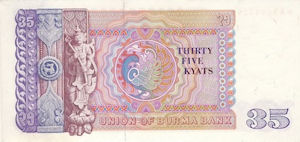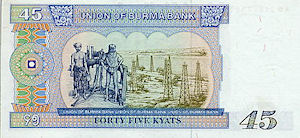Myanmar - Superstition
There perhaps is not a nation in the world so given to superstition as the Burmese. In Burma, omens and fortune-tellers can play a role in political decisions. Not only do they practise judicial astrology, and divination, and put faith in dreams, but they have besides an infinity of foolish and superstitious customs. The two influences of dogmatic religion and empiric superstition exist together in Burma as elsewhere, but are easily distinguished. The superstitions among the Burmese form no part of their religion, since Buddha has forbidden his followers to consult soothsayers, or put faith in omens, or, generally, to give themselves to any superstitious practice.
A person who dies suddenly or is brought down by disaster can become a nat [spirit], held in awe and fear by many. Such spirits may then inspire a body of followers who appease the particular spirit to protect themselves from any harm it might do to them or to receive any powers it may be able to dispense. Over the centuries certain spirits, known as the Thirty-Seven Nats, have attracted considerable public attention and inspired ritual treatment by mediums possessed by these spirits. In socialist Burma the official government position discourages belief in spirits, but in the society at large such beliefs are widespread. Even those who succeed in a brilliant fashion may be thought to have supernatural help from spirits, not necessarily from the classic Thirty- Seven, but from any of countless beings, from Brahmas in the most ethereal heavens to Indra (the spiritual counterpoint of earthly monarchs).
Truth is comprehended at various levels, only one of which is scientific in the Western sense, whereas there are many religious paths to enlightenment or wisdom. The only orthodox path is through the Buddhist sangha [monks], because thousands of strict teachings and rules have kept the realms of nats (spirits) and magic in their proper places. Outside the sangha are various other religious practitioners, such as hermits, wizards, alchemists, astrologers, shamans, mediums, and folk experts of all kinds. All of these will usually operate under an umbrella of Theravada Buddhism but are not considered on the right path by the strictest monks. A nat, whether in the heavens or on earth, is ever present. Only Buddhism is said to master the spirit hosts, but many non-monks also try hard to control them. Everyone seeks to comprehend as much truth as possible, some only through orthodox means, but many also seek the exciting and dangerous, if less noble, paths.
No sooner is an infant born, than they run to some Brahmin to learn what is the constellation that presided at its birth, and this is written upon a palm-leaf together with the day and hour of the birth, to serve for the divinations of which we shall just now speak. The Beden, which, as has been said, is a book of judicial astrology, distributes the stars into a number of asterisms or constellations, distinguished by the names of different men, animals, etc. They believe, or at least feign to believe, as did the ancient Greeks and Romans, that many men and women after their death were transformed into these constellations, and hence they give to them different influences, corresponding with the attributes of the person or thing whose name they bear.
Thus the following history is told of the origin of the constellation, called the Nave. A giantess, who lived to the east of Pegu, having conceived the desire of taking a husband, transformed herself into a rich lady, and thus accomplished her desire. At her death, the body was placed upon a car, to be conveyed to the place of sepulture, but both the car and body disappeared in an instant, and was placed in heaven among the stars, in the figure Nave. Hence all who are born under this constellation are deformed and rude in manners, but rich; and the males are in general great merchants.
Of another constellation called the head of the stag it is related, that a king going out one day to hunt, met a doe big with young. It fled away at his approach, but through fright brought forth in its flight. The king caused the young one to be taken care of, and used every day to go to visit it. This offended the queen, and she caused the animal to be killed; upon which it was transformed into a constellation. The king afterwards died with grief for the death of his favourite. Wherefore those who are born when this constellation prevails, generally die of grief. And of this kind are their stories concerning all the constellations.
Early religious teachings, fanatical beliefs, the worship of idols, sorcery, necromancy and the like, undoubtedly laid the foundation for the popular superstitions now found among all people inhabiting the globe. In the heart of every human being, savage or civilized, exists a settled conviction that he dwells in the midst of an unseen world, peopled with beings of strange powers, who thwart the plans of his own life. Folklore, legends, ghost stories and witch tales were early in the 19th century regarded as mere fables, but in the light of modern science they are now as worthy of study as the surely not less indelicate recitals of Roman and Greek mythology.
The belief in witches, necromancers, ghosts, omens, and superstitions of every kind is rife among many people. In Burma it is rather a suspicious thing to give money for a charitable ohiect. It is supposed to mean that the donor has been very wicked and is desirous to make amends.
The Karens offer animal sacrifices, to the spirits and demons, of pigs, dogs, and fowls. The most solemn sacrifice is that of a fowl, from the bones of which omens in all important matters are derived. 'The thigh bones of a chicken are taken out, and, after prayer and making a condition that the bones may exactly correspond, or they may differ in some particular; that the indentations for the tendons may be like or unlike; that the bones may be even or uneven-the two bones are held up abreast of each other between the thumb and finger and carefully examined. It requires a practised eye to read the result accurately; and thero are many nice distinctions known only to the Elders, who do not always agree in their readings. All their sacrifices are accompanied by plentiful supplies of ardent spirits, which, after having been dedicated to the spirits, and a libation poured out, are consumed by all present.
The different Burmese omens of good or evil fortune are drawn from an immense number of objects; as from the wood with which their houses are built, from their boats and carriages, from the aspects of the sun, moon, and planets, from the howling of dogs, and the singing of birds etc. and also from the involuntary movements of the members of one's own body.
The sun and the planets afford numerous signs from prognostication. When any of them approach the disk of the moon, and especially if any of them pass over it, great evils are apprehended; as the destruction of kingdoms, and the ruin of countries. If the sun rises widi a terrible aspect, great murders will follow; but if it appear with extraordinary brightness, then there will be war. In those four months in which Venus is not seen, in any month when an eclipse or an earthquake happens, and in that in which the year commences it is unlucky to marry, or to build a house, or to cut one's hair, as death by drowning or some such dreadful catastrophe will be the consequence. If the planet Mercury approaches the moon, it is a sign that the embankments of the rice-grounds will be ruined and the waters dried up. If Saturn approaches it, there will be war upon the confines of the kingdom; and if Mars comes near, all things will be sold at high prices. If this planet passes to the left of the Pleiads, it is a sign of a great earthquake; and so of many other combinations of the planets, from which auguries are derived. The appearance of comets is also considered as ominous.
In the time of war, or during a lawsuit there is a curious way of finding out the success to be expected. Three figures are made of cooked rice, one representing a lion, another an ox, and a third an elephant. These are exposed to the crows, and the augury is taken according to which is eaten. If they fall on the figure of the lion it is a sign of victory, if they eat that of the ox, things will be made up by accommodation, but if they take the elephant, then bad success is to be looked for.
The present government has discouraged books and publications on nats, wizards, witches, ghosts, and supranormal powers in general. In terms of Buddhism proper, the official position has stressed the scholastic side of monastic endeavor, not the meditation aspects which reputedly are accompanied by extensive mystical power. The implication is clear: modern socialists should be more rational and scientific in making decisions on economics and politics, and the public may very well agree with that position. The military as individuals, however, are well-known supporters of the occult, if only to harness whatever protective magic a practitioner may be able to provide to those who must take military risks. Charms, tattoos, spells, and protective alchemical mercury balls may help in moments of danger, and the theory prevails that it is better to he safe than sorry. Thus, the soldier may have a curious ambivalence toward all things occult. On the jungle trail, open to snipers, a military socialist may hope his tattoo works, but behind a desk in Rangoon he may deny publication rights to a book on nats.
Western rationality is not always apparent in regime decision-making. Than Shwe reportedly relies on favored soothsayers - one such seer advised moving the capital to the interior because Rangoon would be subject to street disturbances and a horrific storm. Numerology also factors in. Witness the overnight shift to a currency divisible by nines in 1987 and the release of 9,002 prisoners in September 2008, reportedly to ensure an auspicious 2009. Such decision methods may sound strange, but they are everyday elements in the lives of many Burmese.
The 75 Kyat note by Union of Burma Bank in November 1985 is believed to have been introduced to commemorate Ne Win's birthday. He was the head of state from 1962 to 1981. The 75 Kyat note was a circulation note, and was followed by the 15 and 35 Kyat notes in 1986. However, the Burmese government demonetized the 25, 35 and 75 Kyat notes in 1987, an act that was followed by political riots, and eventually a coup in 1988. The 45 and 90 Kyat were introduced in 1987, the number nine being another favorite number of Ne Win.


|
NEWSLETTER
|
| Join the GlobalSecurity.org mailing list |
|
|
|

